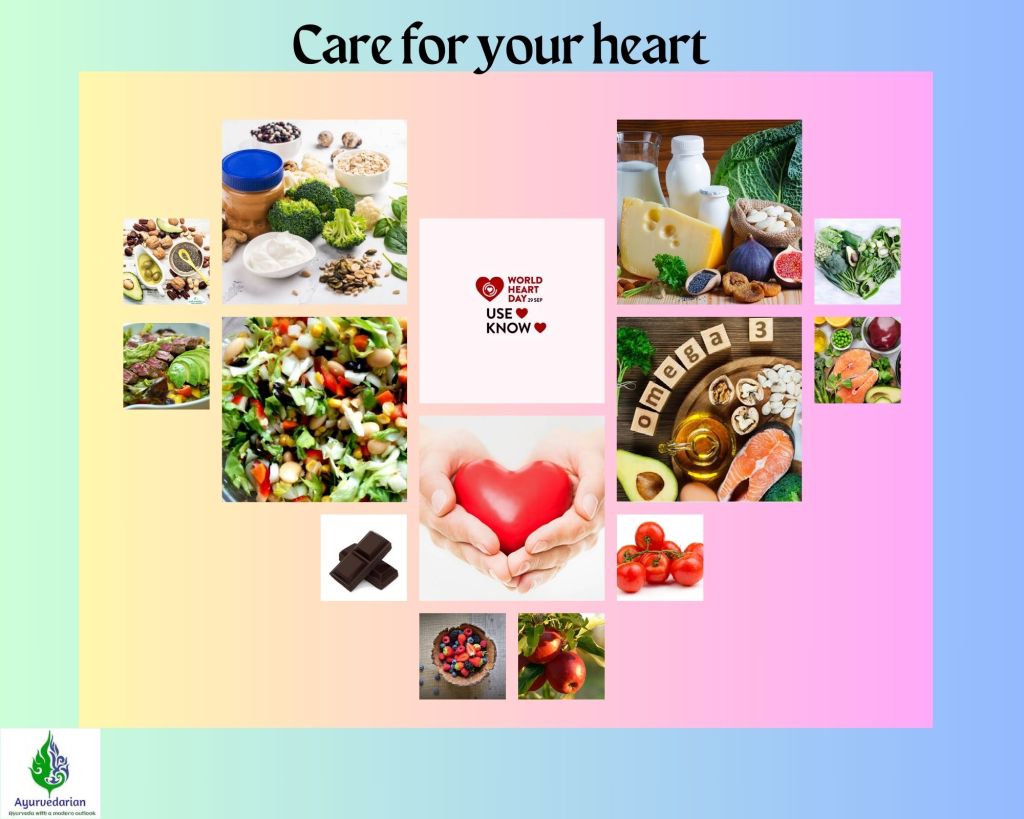‘UseHeart KnowHeart ‘ is the theme for the World Heart Day 2023. Whatever the theme, world heart day is observed to create an awareness about the importance of heart care to prevent cardiovascular diseases and deaths. The theme says...

‘UseHeart KnowHeart ‘ is the theme for the World Heart Day 2023. Whatever the theme, world heart day is observed to create an awareness about the importance of heart care to prevent cardiovascular diseases and deaths. The theme says ‘use heart know heart’-which stresses on the proper healthy usage of our heart which would be possible only when we know our hearts well. In the recent days we have seen an extreme rise in the deaths and cases due to cardiovascular diseases, and this makes it more and more important that we know our hearts better and thereby protect it better and better. Ayurveda considers hridaya (heart) as one of the trimarmas (03 vital points) & dashapranaayatanas (10 life bearing organs). Ayurveda also places a great importance on taking care and protecting this vital organ in the body.
A muscular organ/pump which beats about 2.5 billion times over an average lifetime helps circulate millions of litres of blood along with steady flow of oxygen, fuel, hormones, and other compounds to all the parts of the body. It also helps cleanse the body of the waste products as well. If this vital organ stops, essential functions fail, almost instantly. Therefore maintaining a healthy heart is important to maintain optimum health and wellness.
Some of the main causes which can be controlled to maintain o healthy heart include:
Cholesterol and blood pressure regulation Reduce emotional stress and negative feelingsHow to take better care of your heart?
Consume or have a heart healthy diet Exercise regularly Avoid smoking & alcoholAyurveda considers hridaya the seat of prana or the life force. Ayurvedacharyas have mentioned that hridaya is a sadyapranahara marma or a vital point which if injured causes immediate death. So utmost protection of this organ is essential. Prana or life force is circulated throughout the body from the hridaya. Any injury or blockage will affect the flow of prana thereby leading to death. Nature has provided quite a strong bony cage to protect the hridaya from external injuries but especially in today’s world due to the fast-paced lifestyle, unhealthy & irregular diet, and immense unavoidable stress the hridaya or heart get affected internally leading to various cardiac conditions. Ayurveda also considers food, sleep, and emotional health as the pillars of life. Aahara o food should be consumed according to one’s body type (prakriti) & imbalances. Maintaining a regular healthy aahara style of diet is one of the most important aspects of maintaining the health of the heart.
In this brief article I am not going into the depths of a healthy diet but just giving out the 12 most important nutrients required to maintain the health of the heart.
According to modern nutrition, the 12 most important nutrients for the heart are:
Magnesium Calcium Fibre MUFA Omega 3 Folate Quercetin Lycopene CoQ10 Resveratrol Polyphenols & phytosterols L.Carnitine Magnesium: A humble mineral necessary for more than 300 biochemical reactions in the body, helps maintain nerve and muscle function, keep the heart rhythm steady, and maintains BP. Some of the best sources of magnesium wholegrains, black beans, soy and tofu, almonds, pumpkin seeds, sesame seeds and spinach. In the modern times almost 80% of the adults are magnesium deficient. So just add some seeds or walnuts o spinach into your diet\ Calcium: An important element known to strengthen bones and muscles but how is it useful to the heart? Among many other parts, our heart is made up of over 3 billion muscle cells which contract during each heartbeat and together are responsible for the pumping action of the heart. To ensure the function, researchers have found that the cells utilise calcium particles which create a link between the electrical activation and mechanical contraction. However excessive calcium leads to abnormal electrical signals leading to heart rhythm disorders. So make sure to include an optimum amount of not only calcium but also Vitamin D for both your bone and heart health. Milk and dairy products and fish along with sunlight are some sources. Fiber: Fiber is one of the foremost ingredients necessary for our heart health. Soluble and insoluble fiber both are immensely beneficial in preventing heart disorders. They improve the blood lipid profiles, lower BP, improve insulin insensitivity, reduce inflammation and maintain a healthy body weight. In addition to fibers, fiber rich foods are generally rich in phytochemicals and antioxidants as well. Whole grains, green leafy vegetables, sprouted legumes, nuts & seeds at least once a day provide you with adequate fiber and roughage as well. MUFA: Monosaturated fats are known to lower the bad LDL cholesterol & increase the good HDL cholesterol. they also provide raw materials for the development and maintenance of all our cells. Just replacing saturated fats and trans fats in our food diet with MUFA will give a boost to our heart health. The most common cooking oils like olive oil, canola oil, sesame oil, coconut oil etc, nuts like almonds, peanuts, walnuts and avocados are rich in MUFA making them heart-healthy. Omega-3: One of the chemical that cannot be made by our body, Omega-3 helps decrease inflammation, prevent blood clotting, lower LDL & also have a positive effect on the heart’s rhythm. They help maintain a healthy heart by lowering BP & cholesterol levels. Fish like salmon and tuna are rich in Omega-3. Vegetarian sources include vegetable oils, walnuts, flax seeds & oils, and leafy vegetables. Folate: Homocysteine is an amino acid that is linked to the hardening of arteries leading to coronary artery diseases. Research has proven that B vitamin reduces homocysteines and folic acid/folate prevents the thickening of arterial walls. Green leafy vegetables, lentils, sprouts & soy are all the richest sources of Vit B of folates. Quercetin: An important heart-healthy flavonoid that prevents inflammation, and blood clot formation. As the famous saying goes “An apple a day keeps a doctor away” An apple a day boosts your Quercetin intake thereby lowering your risk of coronary heart diseases & heart conditions. Lycopene: The antioxidant which gives the tomatoes its bright red colour is a powerful cardio-protector as well. It reduces or maintains the blood pressure and cardiac inflammation is prevented. This protects you from all types of cardiovascular conditions. One of the reasons why tomatoes are called love apples. CoQ10: Co-enzyme Q10 is found in very high quantities in the heart. This enzyme helps in reducing oxidative stress in the cells and improves mitochondrial functions. It increases exercise capacity and reduces /maintains blood pressure. It is a natural antioxidant found abundantly in beef, mackerel, sardines, and soy oil. Resveratrol: A powerful antioxidant found abundantly in dark chocolate and red wine is also an effective anti-inflammatory substance. It prevents inflammation of arteries and nerves and also the formation of blood clots thereby preserving memory and brain function and prevents heart diseases and strokes. So a small glass of red wine or a piece of dark chocolate a day keeps your cardiologist away. Phytosterols and polyphenols: Plant sterols resemble cholesterol in the body, thereby their intake limits the absorption of cholesterol in the body. Polyphenols relax and dilate the blood vessels thereby reducing or lowering blood pressure. Found in berries, wheat germ, almonds, Brussels sprouts and so on…these make up for the cholesterol and thereby prevent blockages in the arteries. L Carnitine: A nutrient that helps maintain healthy cholesterol levels and improves heart functions as it breaks down fats into energy. Research also suggests that after a heart attack, it helps improve recovery and exercise tolerance. It is mainly found in avocados and animal proteins.Ayurveda considers hridaya as the seat of prana or life force. The life energy or force i.e., prana has to flow through the body uninterruptedly throughout one’s life. Any blockage or interruption or malfunctioning in the system can cause cardiac conditions. Ayurveda believes in the balance of the doshas and various elements of the body to maintain health and wellness. Diet regimen (aahara vichara), lifestyle changes (dinacharya, rtucharya, sadvritta etc) and treatments & therapies including cleansing therapies like Panchakarma help to maintain the health of the heart.
Ayurveda mentions that one should have a diet that is suitable for one’s body type considering the imbalances as well. The food should be prepared with a pleasant mindset and while having as well, food should be consumed consciously and pleasantly. The digestive fire (agni) should be maintained at optimal level. Whole foods, fresh, organic, seasonally & regionally available have to be consumed for a healthy heart.
Minor lifestyle changes in co-ordination with our occupation and situations make a large impact on the health of the heart. Dinacharya (daily regimen), rtucharrya (seasonal regimen), and sadvritta (social regimen) mentioned in the texts of Ayurveda make sure that the doshas in the body remain balanced and the system gets the necessary nutrients regularly. Social regimen helps to keep the biggest danger-stress at bay, thereby preventing heart ailments.
Ayurvedic therapies and treatments including the cleansing Panchakarma therapies aid to cleanse the body of all the vitiated doshas and balance cleanse the body of all vitiated doshas and balance the imbalanced doshas thereby opening the various srotas or channels. This prevents all types of cardiovascular disorders and helps maintain a healthy lifestyle as well.
So young or old, man or woman, heart care is the most essential and for that knowing your heart is very important. Use your heart to know your heart and care for your heart.
Eat healthy, Get Active, Maintain weight, Quit all kinds of smoking, manage stress, maintain moderation with alcohol, and control your BP & cholesterol–these are some basic tips for your valuable heart.
Take care of your precious heart even if you want to give it to your loved one!!!!!








